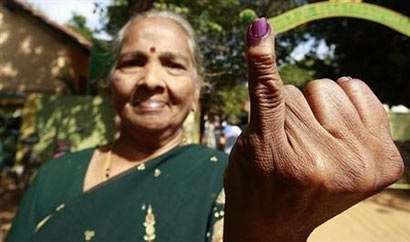Sri Lanka to hold polls in ex-war zone for first time in 25 years

(Reuters) – Sri Lanka will hold provincial elections in the former northern war zone in September for the first time in 25 years, officials said on Friday, a move demanded by the United Nations since the end of three decades of conflict in 2009.
But Northern Province, which includes the Jaffna peninsula, has been under military control since the end of the war and the government had resisted requests by the West to pull out the army.
Ariyaratne Athugala, director general of the Department of Government Information, said President Mahinda Rajapaksa had issued the proclamation to hold northern provincial council polls.
The Elections Commission said they would probably be held on September 21 or 28.
Sri Lanka has repeatedly rejected calls for an independent, international probe into accusation of rights abuses in the final stages of the war. Tens of thousands of civilians, mostly Tamils, were killed in the final months, according to a U.N. panel.
A court on Thursday ordered that 12 elite police commandos, suspects in the killing of five Tamil students during the war, be placed again in detention.
They had been released in 2007 after more than two months in detention after legal authorities said there was no evidence to launch proceedings against them.
The United Nations Human Rights Council in March urged Sri Lanka to carry out credible investigations into killings and disappearances. The U.N. High Commissioner for Human Rights, Navi Pillay, is to visit Sri Lanka in August.
The government has said a military presence is necessary in the north to prevent the re-emergence of terrorism three years after it crushed the Liberation Tigers of Tamil Eelam (LTTE).
Successive governments did not hold provincial polls in the north because most of the territory was under LTTE control.
Sri Lanka introduced provincial councils in 1987 with a constitutional amendment aiming to ensure regional autonomy mainly for the island nation’s north and east where the LTTE had fought to create an independent state for Tamils.
The constitutional amendment, which gives autonomy to provincial councils including powers over police and land, has yet to be fully implemented. (Reuters)
Latest Headlines in Sri Lanka
- Équité launches media guidelines to protect LGBTIQ+ rights in Sri Lanka January 28, 2026
- Saman Ekanayake remanded over state fund misuse January 28, 2026
- IMF commends Sri Lanka’s swift cyclone response, confirms EFF support January 28, 2026
- First Sri Lankan Navy SEAL graduate dies suddenly at 28 January 28, 2026
- Sri Lanka extends support to businesses impacted by Cyclone Ditwah January 28, 2026



This Reuters report is pro-West biased. Civilian deaths were caused mainly by the LTTE who held them as a human shield, a war crime by the LTTE. Reuters glossed over this fact. Reuters also failed to report that nearly 300,000 SL Tamil hostages were saved by the SL army, the world’s largest hostage rescue in history. Reuters failed to give SL credit for this. Reuters has also failed to acknowledge the heroic Humanitarian Operation in which 5000 SL soldiers sacrificed their lives and many more SL soldiers sacrificed their limbs.
Reuters also has failed miserably to report that the 1987 Constitutional change, called the 13th amendment was forced on SL govt by the Indian govt under threat of invasion and that the 13th amendment and the PC Act was drafted by the Indian govt. This legislation was illegal and need to be declared so by the Supreme court of SL and abolished with the ‘white elephant’ PC system after a national referendum, to get the nation’s mandate.
I bet the Reuter’s correspondent got this Tamil woman to pose with her one finger obnoxious salute, to show what she thinks of the PC election in the North.
Blogger 1 has hit the nail on the head.
The Provicial Councils are are not consistent with the Constitution. The people of Sri Lanka will go to courts to determine constitutional validity of the 13th amendment.
In its current form, the residual separatists in our society will use the Provincial Council system to springboard towards division of our isle.
I sincerely wish the elections for the Northern Provincial Council are postponed until the people of sovereign Sri Lanka determine the need for continuation of the 13th Amendment through the parliamentary Select Committee consisting of duly elected representatives.
The Opposition parties have refused to participate in the PSC and are now calling the committee names in keeping with their own agenda.
The peoples of Sri Lanka, whether they are Sinhalese, Tamil or Muslim elected their representatives to Parliament with an expectation of participation in all the business of Parliament.
We did not elect them to Parliament to be negative and boycott important fora where decisions are required that will impact on all Sri Lankans for years to come.
The UPFA members of Parliament are providing a role that is expected of them by ensuring participation. The PSC on the the former Chief Justice concluded its task successfully following the opposition’s departure at the last minute. The PSc that looked into the conduct of the former CJ produced a comprehensive 175 page report on its proceedings within hours of concluding its sittings.
The manner in which the CJ’s PSC conducted its proceedings and reported the outcome has silenced critics within the country as well as in the international legal community.
I am confident that the PSC on the 13th amendment will deliver a superb decision preferably recommending the complete abolition of the India imposed Provincial Councils. This will keep the internal NGO sponsored dissidenets, the opposition, the UN and the lawmakers (and troublemakers) in India silent and admire the capability of Sri Lankans in governing themselves.